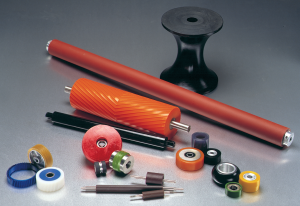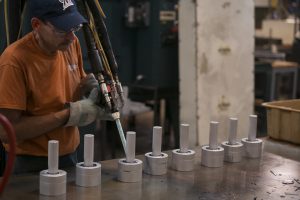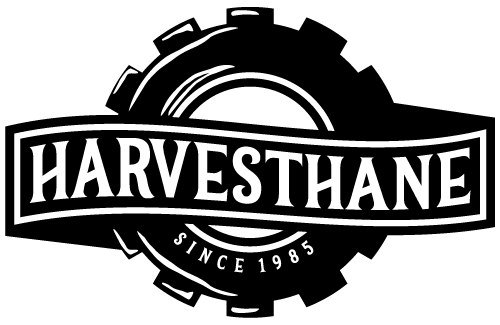Cast polyurethane, formulated to have a balance of characteristics associated with premium materials, is a great solution in demanding roller applications. In addition to its superior material characteristics, urethane can be molded and finished easily.
Material Properties
 • Superior abrasion resistance
• Superior abrasion resistance
In applications, such as manufacturing diapers, forming food product bags, or cash counting systems, urethane offers the abrasion resistance necessary to reduce wear, thereby reducing the frequency of worn roller replacement.
• High load bearing strength
Material handling and conveying systems in many cases transport very large, heavy product. Urethane will handle high loads with minimal deflection and lower compression set permitting product transport systems to function efficiently and longer.
• Increased tear strength
Milling timber, as one example, not only requires abrasion resistance, high load bearing strength, but also high tear strength. In this example, impingements in the urethane roller, created by the rough, heavy logs, will not tear and propagate as easily as with other materials.
• Wide range of hardness
Used in the paper and print industry, lower durometer rollers have the coefficient of friction needed to efficiently move paper, while high durometer rollers are highly effective on transport carts and skate boards.
• Good fluid resistance
Rollers, many times, live in environments filled with some sort of solvent or chemical. Cast polyurethane has good all-around fluid resistance needed in a wide variety of applications including food handling and adhesive applications.
Processing
 • Excellent for overmolding
• Excellent for overmolding
Although cast urethane on its own makes a great material for a roller, sometimes a metal hub or core is used as support or for installation. Exceptionally tough chemical bonding, between urethane and the substrate, dictates the urethane material will tear prior to the bond between the urethane and the substrate failing.
• Easily machined to tight tolerances
Many rollers, such as the ones used in the film and foil industry, tissue and towel industry, or textile industry require tightly tolerance OD. Cast urethane rollers are excellent candidates for tight tolerance machining to meet the needs of the application.
History
The development of polyurethane dates back to the beginning of World War II when it was used as a replacement for scarce rubber materials. Prof. Dr. Otto Bayer is recognized as the “father” of the polyurethane industry for his invention of the basic disocynate poly addition process.
Polyurethane’s first use was in applications such as chemical and corrosion-resistant coatings. Later in the mid-50s, its use grew as new solutions using urethane were identified. It is currently produced in four forms including elastomers, coatings, flexible foams, and cross-linked foams. Elastomers are materials that can be stretched, but will eventually return to their original shape.
Molded Dimensions, Inc.
As a molder of elastomers, Molded Dimensions, Inc. formulates Pentathane® for a wide spectrum of parts and applications. Items molded range in size from the size of a quarter to eight feet diameter. Our capabilities include open cast molding, compression molding, insert bonding, tool design and construction, die cutting, machine finishing, cryogenic deflashing, special packaging and inventory programs.
Pentathane® is Molded Dimensions’ name for its cast polyurethane formulations.
The properties of polyurethane set it apart as an exceptional material that gets the job done. This often times means a longer useful part life, and less downtime for maintenance or repair.



